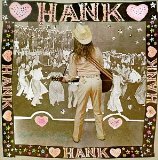Last week, I mentioned that following Led Zeppelin’s 1973 album, my musical interests were changing. I wrote that wholly unaware of the subject of this week’s Midweek Music Moment. By chance, it reveals just how much those interests changed over the course of a couple years.
 On August 31, 1973, Leon Russell released Hank Wilson’s Back, containing cover versions of 13 standards (the CD release has 15) that cover the waterfront of country music. Now I didn’t hear the album or become a fan of it for a couple years but it is one of those albums to which I often return.
On August 31, 1973, Leon Russell released Hank Wilson’s Back, containing cover versions of 13 standards (the CD release has 15) that cover the waterfront of country music. Now I didn’t hear the album or become a fan of it for a couple years but it is one of those albums to which I often return.
Some people thought Russell was either giving up his career as a rock musician or throwing it away with his Hank Wilson alter ego. After all, he not only had excellent selling blues/gospel/rock solo albums, he was the chief mad dog for Joe Cocker’s “Mad Dogs & Englishmen” tour in 1970 and the next year was performing with George Harrison at The Concert for Bangla Desh. Wilson may just have been looking for a change of pace but his timing was excellent. Hank Wilson’s Back hit the record stores during the time longhairs like me were seduced by country rock bands who kept pushing a bit more toward the country end. Although the brightest example may have been the Eagles, bands like Poco, the Ozark Mountain Daredevils, the Marshall Tucker Band and Pure Prairie League were all finding radio play, even at times on the top 40 charts.
Russell, though, ignored the rock part of country rock. This album hits various genres of country music — bluegrass, honky tonk and what I call “crying in my beer” songs — but there’s no doubt it is country music through and through. And it’s damn well performed. There’s a couple reasons for that. One is Russell, a fine musician himself, brought in lots of friends to play on various tunes, including Billy Byrd and J.J. Cale on guitar, Pete Drake on pedal steel, Johnny Gimble on fiddle, Charlie McCoy on harmonica, Carl Radle on bass and Hargus “Pig” Robbins on keyboards. Then there’s the way in which Russell handles the songs, not as a lark but with respect. Russell’s is distinctive, to say the least. Yet it seems to work perfectly with his selections, especially the inflections on “She Thinks I Still Care” and Hank Williams’ classic “I’m So Lonesome I Could Cry.” Russell can also deliver up tempo, such as bluegrass legend Lester Flatt’s “Rollin’ in My Sweet Baby’s Arms,” Hank Williams’ “Jambalaya” and Hank Thompson’s “Six Pack to Go.” In fact, about the only song that seems to miss with me is “The Battle of New Orleans” (and perhaps the closing track of “Good Night Irene”).
Not surprisingly, the album did well in the country world. It reached number 15 on Billboard’s country albums chart in 1973. And reflective of either the power of the country market or the crossover appeal that existed among those attracted to country rock, it also got as high as 28 on Billboard’s top 200 chart that year. It remains a favorite of mine today as one of a handful of albums I look to on those random occasions when I need a country music fix. Plus, it reminds me of a period in the history of my musical tastes that had me exploring and enjoying different roads than usual.
There’s one other thing Hank Wilson’s Back always reminds me of — how callous we can be as kids. Back in junior high, a classmate who could best be described as an outcast was brave enough to perform solo on his acoustic guitar at the annual talent show. I have no recall whether he was good or bad. What I remember is Richard C. played and sang “Jambalaya.” Given the era and our ages, he played to gales of laughter. So, when I hear “Jambalaya” today I wish I could hear his performance with more knowledgeable ears. Maybe it sucked but, if nothing else, I would probably at least be cognizant of the courage he had.
Jambalaya and a crawfish pie and file’ gumbo
‘Cause tonight I’m gonna see my ma cher amio
Pick guitar, fill fruit jar and be gay-o
Son of a gun, we’ll have big fun on the bayou
“Jambalaya,” Hank Williams








Just an FYI – Leon just released the “Best of Hank” and includes “The Ballad of Jed Clampett” as a bonus track. This song alone is worth the album price, but there are many gems and the album has 22 songs.